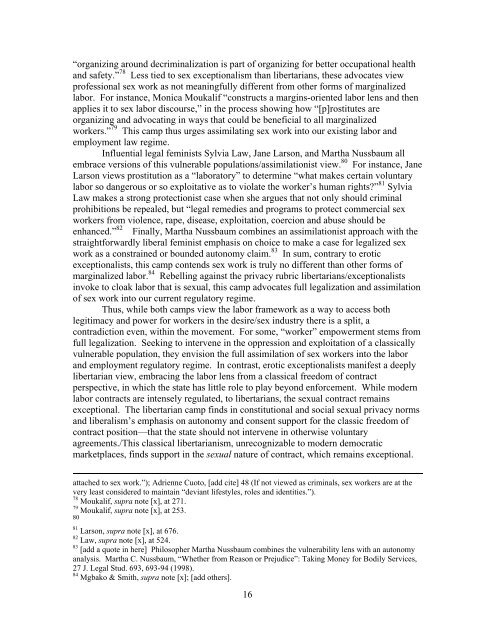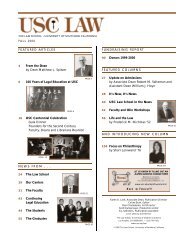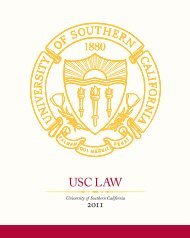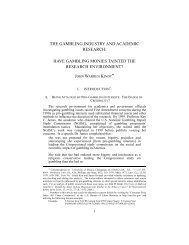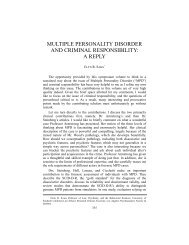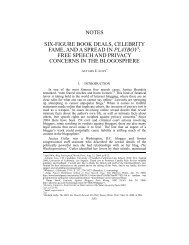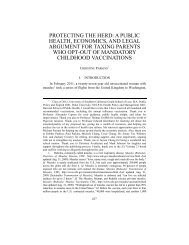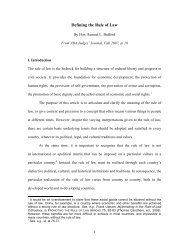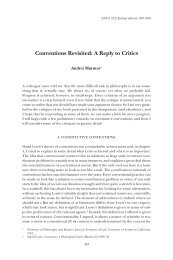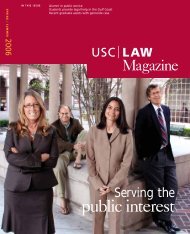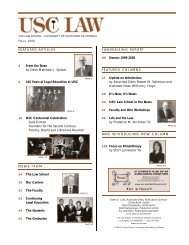1 Regulating Sex Work Adrienne D. Davis VERY ROUGH DRAFT ...
1 Regulating Sex Work Adrienne D. Davis VERY ROUGH DRAFT ...
1 Regulating Sex Work Adrienne D. Davis VERY ROUGH DRAFT ...
You also want an ePaper? Increase the reach of your titles
YUMPU automatically turns print PDFs into web optimized ePapers that Google loves.
“organizing around decriminalization is part of organizing for better occupational health<br />
and safety.” 78 Less tied to sex exceptionalism than libertarians, these advocates view<br />
professional sex work as not meaningfully different from other forms of marginalized<br />
labor. For instance, Monica Moukalif “constructs a margins-oriented labor lens and then<br />
applies it to sex labor discourse,” in the process showing how “[p]rostitutes are<br />
organizing and advocating in ways that could be beneficial to all marginalized<br />
workers.” 79 This camp thus urges assimilating sex work into our existing labor and<br />
employment law regime.<br />
Influential legal feminists Sylvia Law, Jane Larson, and Martha Nussbaum all<br />
embrace versions of this vulnerable populations/assimilationist view. 80 For instance, Jane<br />
Larson views prostitution as a “laboratory” to determine “what makes certain voluntary<br />
labor so dangerous or so exploitative as to violate the worker’s human rights?” 81 Sylvia<br />
Law makes a strong protectionist case when she argues that not only should criminal<br />
prohibitions be repealed, but “legal remedies and programs to protect commercial sex<br />
workers from violence, rape, disease, exploitation, coercion and abuse should be<br />
enhanced.” 82 Finally, Martha Nussbaum combines an assimilationist approach with the<br />
straightforwardly liberal feminist emphasis on choice to make a case for legalized sex<br />
work as a constrained or bounded autonomy claim. 83 In sum, contrary to erotic<br />
exceptionalists, this camp contends sex work is truly no different than other forms of<br />
marginalized labor. 84 Rebelling against the privacy rubric libertarians/exceptionalists<br />
invoke to cloak labor that is sexual, this camp advocates full legalization and assimilation<br />
of sex work into our current regulatory regime.<br />
Thus, while both camps view the labor framework as a way to access both<br />
legitimacy and power for workers in the desire/sex industry there is a split, a<br />
contradiction even, within the movement. For some, “worker” empowerment stems from<br />
full legalization. Seeking to intervene in the oppression and exploitation of a classically<br />
vulnerable population, they envision the full assimilation of sex workers into the labor<br />
and employment regulatory regime. In contrast, erotic exceptionalists manifest a deeply<br />
libertarian view, embracing the labor lens from a classical freedom of contract<br />
perspective, in which the state has little role to play beyond enforcement. While modern<br />
labor contracts are intensely regulated, to libertarians, the sexual contract remains<br />
exceptional. The libertarian camp finds in constitutional and social sexual privacy norms<br />
and liberalism’s emphasis on autonomy and consent support for the classic freedom of<br />
contract position—that the state should not intervene in otherwise voluntary<br />
agreements./This classical libertarianism, unrecognizable to modern democratic<br />
marketplaces, finds support in the sexual nature of contract, which remains exceptional.<br />
attached to sex work.”); <strong>Adrienne</strong> Cuoto, [add cite] 48 (If not viewed as criminals, sex workers are at the<br />
very least considered to maintain “deviant lifestyles, roles and identities.”).<br />
78 Moukalif, supra note [x], at 271.<br />
79 Moukalif, supra note [x], at 253.<br />
80<br />
81 Larson, supra note [x], at 676.<br />
82 Law, supra note [x], at 524.<br />
83 [add a quote in here] Philosopher Martha Nussbaum combines the vulnerability lens with an autonomy<br />
analysis. Martha C. Nussbaum, “Whether from Reason or Prejudice”: Taking Money for Bodily Services,<br />
27 J. Legal Stud. 693, 693-94 (1998).<br />
84 Mgbako & Smith, supra note [x]; [add others].<br />
16


